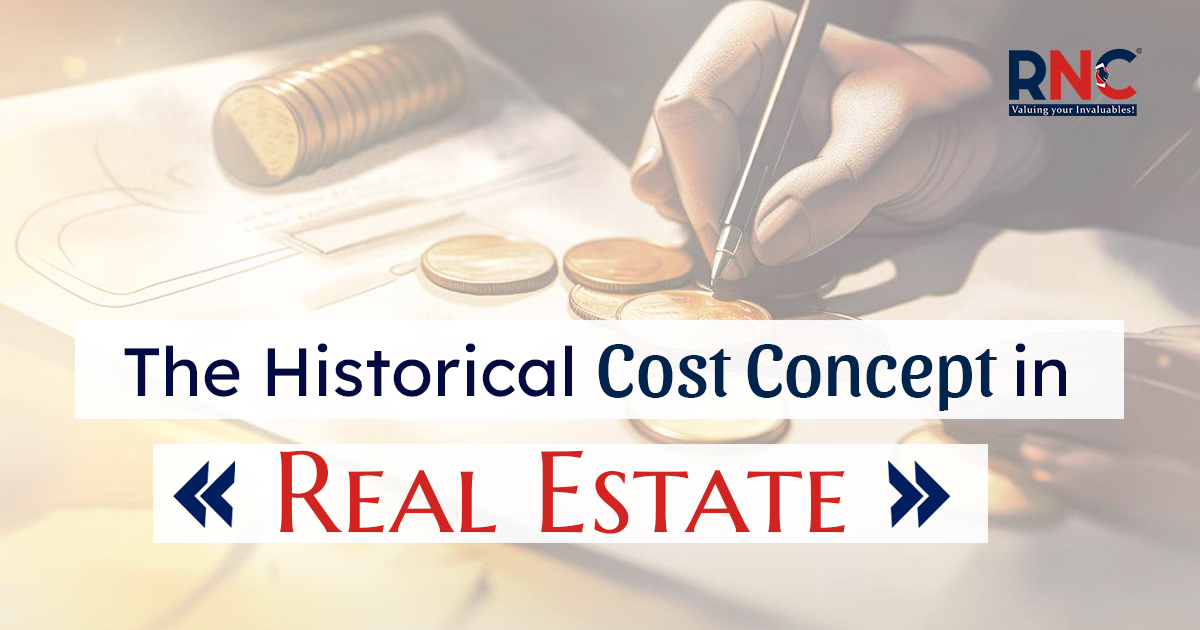
Real estate valuation is a very important process in the world of property investment and development. It involves calculating the monetary value of a Property Valuation. It plays an important role in various real estate transactions, including buying, selling, leasing, and financing. Among the different approaches and concepts used in real estate assessment, the Historical Cost Concept has stood the test of time.
Understand the Historical Cost Concept
Real estate valuation makes use of the basic accounting idea known as the historical cost concept. Accounting to rule, an asset, though this example a property, shall be reflected on the financial accounts at its original purchase price. This initial cost covers not just the price paid for the property but also any related costs, such as those incurred at the time of acquisition for closing costs, legal fees, and renovation costs.
The main goal of the Historical Cost Concept is to give asset Valuation assessments a precise and sensible foundation. Since it shows the actual price paid when the property was purchased, it offers a straightforward and open method of accounting for real estate investments. By guaranteeing that the value of assets in financial statements is not overstated, this idea supports the prudential principle.
The Historical Cost Concept’s Advantages in Real Estate Valuation
Consistency:
Property valuation is consistent thanks to the historical cost concept. The initial purchase price stays fixed regardless of market changes, providing stakeholders and investors with a reliable benchmark.
Transparency:
The Historical Cost Concept makes sure that financial reporting is transparent by listing each item at its original cost. Anyone looking through the financial statements for the property may simply determine how much the valuation actually costs to acquire.
Conservative Approach:
This notion adopts a conservative valuing strategy, which can be helpful when there is economic turbulence. In addition to helping to reduce financial risks, it stops asset overvaluation.
Taxation:
The Historical Cost Concept is frequently used as the foundation for property taxation. With this idea, tax assessment is made easier and there are fewer chances of property valuation disputes.
Read More: Understanding Startup Valuation: A Guide for Investors and Venture Capitalists
Challenges and Limitations
While the Historical Cost Concept offers several advantages, it is not without its limitations and challenges:
Depreciation:
Over time, variables like wear and tear or changes in the real estate market may prevent the Historical Cost Concept from effectively reflecting a property’s present market value.
Market fluctuations:
When the market is rapidly appreciating, undervaluing assets merely based on previous costs might result in missed investment possibilities.
Financing and Decision-Making:
When deciding on financing options or evaluating the performance of the property, lenders and investors may require a more recent and accurate appraisal.
Reporting Fair Value:
Accounting guidelines may stipulate that, in some cases, the fair market value of a property, as opposed to its historical cost, must be reported. Companies that hold investment properties for trading or at fair value should take note of this in particular.
Read More: Precision vs. Reality: Exploring Challenges in Equity Valuation
Conclusion
In real estate valuation, the historical cost concept is a very useful tool for property founders, investors, and financial analysts. It gives consistent, cautious, and transparent approaches to accounting for property acquisitions. However, it’s crucial to note that, while the Historical Cost Concept has significant advantages, it may not always precisely reflect a property’s current market value.
The Historical Cost Concept is frequently supplemented in practice by a variety of valuation techniques, such as market-based and income-based approaches. They can do this to get a more thorough understanding of a property’s value, which is necessary for making wise investment choices and navigating the changing real estate market.
FAQs:
1. What is the Historical Cost Concept in real estate valuation?
The Historical Cost Concept is an accounting principle where an asset, such as a property, is recorded in financial statements at its original purchase price. This includes the price paid for the property and related acquisition costs, such as closing costs, legal fees, and renovation expenses.
2. Why is the Historical Cost Concept important in real estate valuation?
The concept provides a consistent, transparent, and conservative approach to valuing real estate assets. It helps stakeholders and investors make informed decisions by ensuring that asset values are not overstated in financial statements.
3. What are the main advantages of using the Historical Cost Concept?
- Consistency: The value remains fixed at the purchase price, providing a stable benchmark.
- Transparency: It ensures clear and straightforward financial reporting.
- Conservative Approach: Reduces the risk of overvaluation, especially during economic turbulence.
- Simplified Taxation: Facilitates easier tax assessments and minimizes valuation disputes.
4. What are the limitations of the Historical Cost Concept?
- Depreciation: It does not account for wear and tear or market changes, which may affect the current value.
- Market Fluctuations: During market appreciation, undervaluation based on historical costs may lead to missed opportunities.
- Financing: Lenders may require updated valuations for financing decisions.
- Fair Value Reporting: Certain accounting standards may require reporting fair market value instead of historical cost.
5. How does the Historical Cost Concept support the prudential principle?
By recording assets at their original purchase price, the concept ensures a cautious valuation approach, minimizing the risk of overstating an asset’s value in financial statements.
